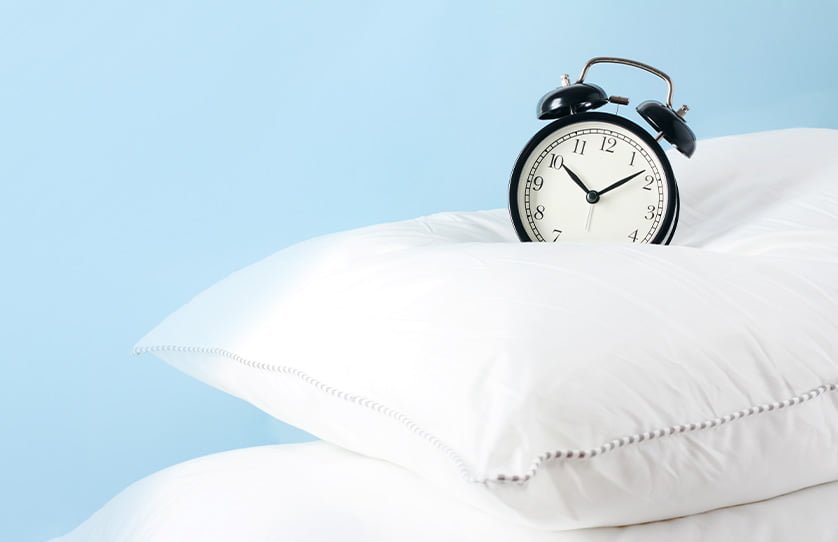Our body, like all living things, runs on a natural clock known as circadian rhythm. It regulates the hormones in our brain and body. It distinguishes between when to sleep and when to wake. In nature, the circadian rhythm is controlled by the sun, and in humans it is influenced by a number of things we do that can help or hinder the wake/sleep cycle.
10 Ways to Get a Good Night’s Sleep
- Bright light during the day
- Reduce blue light exposure at night
- Avoid caffeine late in the day
- Keep naps short
- Consistent sleep schedule
- Avoid alcohol
- Optimal sleep environment
- Avoid late night eating
- Relaxing bedtime routine
- Melatonin supplements (with any supplements or medication it’s always recommended that you seek the advice of a health professional).
Bright Light During the Day
The healthiest way to maintain the natural circadian rhythm of our body is through the sun. Unfortunately, due to hectic lives and crazy work schedules, we’re not all able to rise and set with the sun. Even so, daily exposure to the sun can help to improve sleep quality and duration. When the sun isn’t an option, using bright lights during the day will help cue the circadian rhythm that it is time to be awake.
Avoid Caffeine Late in the Day
Stimulants like caffeine affect the nervous system and can make it difficult to wind down and relax when it’s time for bed. The caffeine from that morning cup of coffee stays in your system for 6-8 hours. Energy drinks and soft drinks can be loaded with caffeine and should be avoided in the late afternoon and early evening hours. Reducing the amount of caffeine you ingest during the day can greatly improve your ability to sleep at night.
Consistent Sleep Schedule
A key way to getting the best sleep is to stick to a regular sleep schedule, even on the weekends. By keeping a consistent wake and sleep time your circadian rhythm won’t be disrupted by frequent changes in what time you get up and when you go to bed.
Optimal Sleeping Environment
There are several factors that play a role in optimising your sleeping environment. Creating the best place for sleep includes finding the ideal temperature, reducing external noise and light, and having a comfortable mattress and pillow. You spend ⅓ of your life sleeping so don’t be afraid to splurge on a high quality mattress and pillow.
Relaxing Bedtime Routine
Our lives tend to be filled with busy schedules and hectic routines that keep us on our toes making it hard to settle down at night. Creating a relaxing bedtime routine can help relieve the stresses of the day and improve quality of sleep. Listening to relaxing music, taking a hot bath, or practicing meditation and deep breathing exercises can help settle those jangled nerves.
Reduce Blue Light Exposure at Night
Our electronics - televisions, computers, tablets, and smartphones - emit blue light which interferes with our body’s ability to produce melatonin. This hormone is responsible for regulating sleep and regulates antioxidant defenses, blood pressure, body temperature and cortisol levels, as well as sexual and immune function. Light from our electronic devices trick the body into thinking it is still day time, making it harder to fall asleep at night. Discontinue use of these devices at least one hour before bedtime to help trigger our natural sleep cycle.
Keep Naps Short
Taking long naps during the day will confuse your circadian rhythm and can affect your quality of sleep at night. If you find you need a quick nap during the day to recharge, keep it under 30 minutes to prevent disrupting the natural wake/sleep cycle.
Avoid Alcohol
While some people find drinking alcohol to be a relaxing way to wind down, it can have adverse effects on your sleeping. Drinking alcohol can cause or increase sleep apnea, snoring, and can disrupt sleep patterns. It also affects the bodies ability to produce melatonin and decreases the natural elevations of the human growth hormone, both of which negatively impact the circadian rhythm.
Avoid Late Night Eating
Researchers found that eating late at night negatively affects several aspects of sleep quality, They found that food consumption at night can impact the time it takes to fall asleep, the amount of REM sleep, and the frequency of waking after falling asleep. In addition, it is recommended to limit the amount of liquids consumed before bed to reduce the number of trips to the bathroom, another sleep disrupter.
Melatonin Supplements
If you find you’re still having trouble getting a good night’s sleep, you may consider taking a melatonin supplement. These sleep aids are helpful for people with insomnia, jetlag, or some sleeping disorders. As with any medication or supplement, talk with your doctor and learn more about possible side effects.

